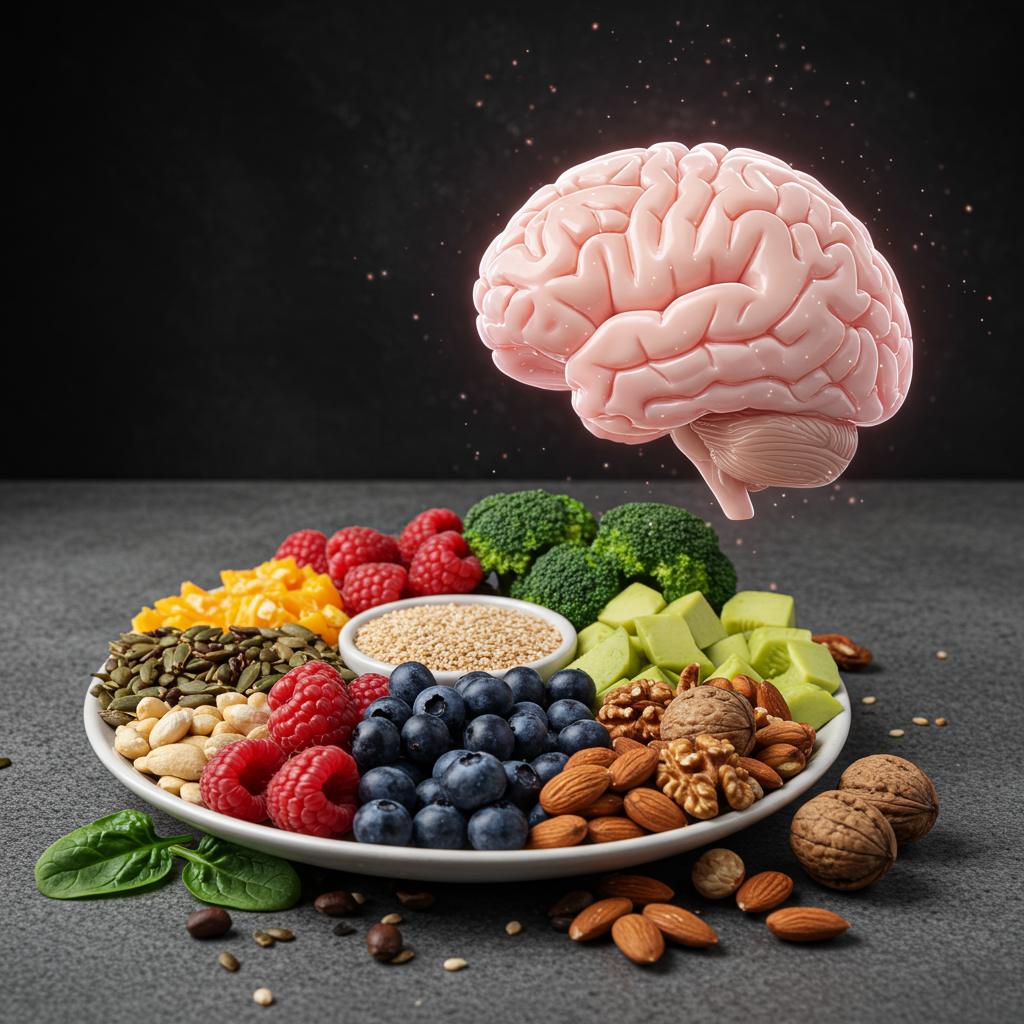Could simple changes to your plate significantly protect your mind as you age? A groundbreaking new study featuring researchers from the University of Hawaii (UH) Cancer Center suggests the answer is a resounding yes. Their findings reveal that following a specific <a href="https://news.quantosei.com/2025/06/29/alzheimers-awareness-the-food-brain-connection/” title=”Unlock Brain Health: The Essential Diet for Alzheimer's”>dietary pattern, known as the MIND diet, can dramatically lower your chances of developing Alzheimer’s disease and related forms of dementia (ADRD). What’s even more hopeful? This powerful benefit applies even if you start making these healthy food choices later in life.
The study provides compelling evidence that prioritizing brain-healthy foods is a powerful strategy against cognitive decline. It reinforces the message that it is truly never too late to make dietary improvements for long-term neurological well-being.
What is the MIND Diet and How Does it Protect Your Brain?
The MIND diet isn’t just another trendy eating plan. Its name is an acronym for Mediterranean-DASH Intervention for Neurodegenerative Delay. As the name suggests, it strategically combines elements from two highly respected dietary patterns: the Mediterranean diet, known for heart health and longevity, and the DASH (Dietary Approaches to Stop Hypertension) diet, proven to lower blood pressure.
This hybrid approach specifically emphasizes foods that research has linked to improved brain function and a reduced risk of neurodegenerative diseases. Key components include leafy green vegetables, nutrient-rich berries, nuts, and olive oil. It also encourages moderate consumption of whole grains, beans, fish, seafood, and poultry. Conversely, the diet advises limiting intake of foods high in saturated and trans fats, added sugars, and sodium, such as red meat, butter, margarine, pastries, sweets, fried foods, and fast food.
These specific food groups provide essential nutrients, antioxidants, and healthy fats that combat inflammation and oxidative stress, factors believed to contribute to brain aging and dementia. By focusing on these power foods, the MIND diet creates an optimal environment for brain cells to thrive and communicate effectively.
Delving into the Study: A Massive Multiethnic Cohort
The powerful conclusions about the MIND diet’s effectiveness come from analyzing decades of data within the large-scale Multiethnic Cohort Study (MEC). Initiated in the 1990s, the MEC has tracked the health, lifestyle, and dietary habits of nearly 93,000 U.S. adults aged 45 to 75 at the study’s beginning. This diverse cohort, co-led by researchers from the UH Cancer Center and USC Norris Cancer Center, includes participants from various racial and ethnic backgrounds, making the findings particularly robust and relevant to the U.S. population.
Over the extensive follow-up period, which spanned many years, researchers identified that more than 21,000 of these participants received a diagnosis of Alzheimer’s or related dementias. By comparing the dietary patterns of those who developed ADRD against those who didn’t, researchers could pinpoint the impact of specific diets like the MIND diet. This massive dataset allowed for a detailed examination of dietary adherence over time and across different demographic groups.
The study was presented at NUTRITION 2025, the flagship annual meeting of the American Society for Nutrition, coinciding with the June observance of Alzheimer’s and Brain Awareness Month. The findings underscore the critical role of diet as a modifiable risk factor in the fight against cognitive decline.
Key Findings: Baseline Adherence vs. Dietary Improvement
The UH-featured study uncovered several significant results regarding the MIND diet’s protective effects against dementia:
Overall Baseline Benefit: Participants who showed higher adherence to the MIND diet at the start of the study were found to have a 9% lower risk of developing dementia overall compared to those with lower adherence scores.
Stronger Effects in Specific Groups: The protective effect was even more pronounced among certain racial and ethnic groups. Participants identifying as African American, Latino, or White who closely followed the MIND diet showed approximately a 13% lower risk of dementia at baseline.
The Power of Improvement: Perhaps one of the most encouraging findings is the impact of improving dietary habits over time. The study tracked changes in diet over a 10-year period. Participants who increased their adherence to the MIND diet during this decade experienced a remarkable 25% lower risk of dementia compared to individuals whose adherence declined. This significant benefit was observed even among those who didn’t follow the diet perfectly initially but made positive changes.
Dr. Song-Yi Park, a Professor in the Population Sciences in the Pacific Program at the UH Cancer Center and a presenting author of the study, emphasized the importance of these results. “Our study findings confirm that healthy dietary patterns in mid-to-late life and their improvement over time may prevent Alzheimer’s and related dementias,” she stated. She added, “The take-home message is encouraging… Eating more plant-based, nutrient-rich foods—even later in life—can protect your brain.”
Ethnic Variations and Future Directions
While the MIND diet showed promising results for many, the study also highlighted variations in its impact across different ethnic groups. The benefits of baseline adherence were not as apparent among Asian American participants and showed a weaker trend in Native Hawaiians.
Researchers suggest this could be due to differences in traditional dietary patterns within these communities. Some traditional diets may already include brain-healthy foods not fully accounted for in the standard MIND diet scoring, potentially offering protection through different pathways. This finding suggests that tailored dietary advice might be needed for diverse populations to maximize brain health benefits.
The study is observational, meaning it identifies associations rather than proving direct cause and effect. However, the consistency of the findings across a large, diverse cohort strengthens the evidence for the MIND diet’s role in dementia prevention. Researchers recommend further interventional trials to confirm these results and explore culturally adapted dietary strategies that could benefit all populations. The study underscores the immense value of long-term research initiatives like the Multiethnic Cohort in understanding health and disease across diverse communities.
How to Adopt the MIND Diet for Brain Health
Inspired to make brain-healthy changes? Adopting the MIND diet doesn’t require drastic overnight shifts. You can start gradually incorporating more of the emphasized foods into your daily meals.
Focus on adding:
Leafy greens daily (spinach, kale, collards)
Berries several times a week (blueberries, strawberries)
Nuts most days
Olive oil as your primary cooking fat
Whole grains regularly
Beans/legumes several times a week
Fish or seafood at least once a week
Poultry a couple of times a week
Consciously reduce your intake of:
Red meat (aim for less than 4 servings per week)
Butter and margarine
Cheese (limit to once a week)
Pastries and sweets
Fried foods and fast food
Making small, consistent improvements over time, as the study demonstrated, can lead to significant reductions in dementia risk.
Frequently Asked Questions
What exactly is the MIND diet and what does it include?
The MIND diet is a dietary pattern created to specifically support brain health and potentially delay neurodegenerative diseases like Alzheimer’s. Its name stands for Mediterranean-DASH Intervention for Neurodegenerative Delay. It’s a hybrid of the Mediterranean diet and the DASH diet, focusing on foods scientifically linked to cognitive protection. Key foods to eat more of include leafy green vegetables, berries, nuts, olive oil, whole grains, beans, fish, and poultry. It recommends limiting red meat, sweets, fried foods, cheese, butter, and margarine.
Is it too late to start the MIND diet if I’m already older?
Absolutely not. A key finding from the UH-featured study highlighted that it is never too late to make beneficial dietary changes for your brain. The research showed that participants who improved their adherence to the MIND diet over a 10-year period saw a substantial 25% lower risk of dementia compared to those whose diets worsened, regardless of their starting age or initial diet quality. Making healthier choices now can still have a significant positive impact.
Did the study find that the MIND diet benefits everyone equally?
The study analyzed data across multiple ethnic groups within the Multiethnic Cohort. While the MIND diet showed a strong protective effect overall, particularly for those who improved their adherence, the benefits were most apparent for participants identifying as African American, Latino, and White. The association was less clear for Asian American and Native Hawaiian participants. Researchers suggest this variation might be due to differences in traditional dietary patterns and may indicate a need for culturally tailored dietary guidance in the future.
Conclusion
The new study led by researchers utilizing the Multiethnic Cohort data offers compelling evidence that the MIND diet is a powerful tool in the fight against Alzheimer’s and related dementias. Its emphasis on specific brain-boosting foods derived from the Mediterranean and DASH patterns provides a clear roadmap for dietary improvements. Most importantly, the finding that improving your diet over time can lead to a significant 25% lower risk offers immense hope. It reinforces the message that positive change is possible at any age and that prioritizing brain health through your diet can make a tangible difference in lowering dementia risk. Consider taking small steps today towards incorporating more MIND-friendly foods into your meals for a healthier brain tomorrow.




